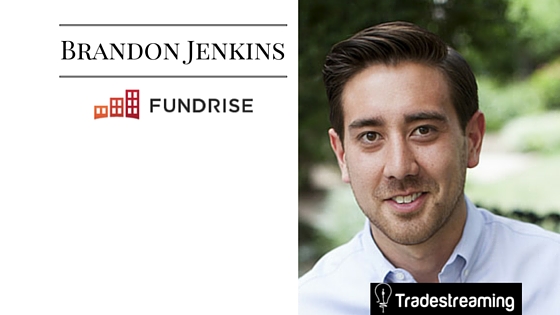Fundrise is a leader in online real estate investing and it’s soon to get even more interesting as recent regulatory changes are making it easier for crowdfunding platforms to incorporate even more investors. It’s an interesting time for the firm: it recently announced it had raised $50M for an e-REIT in light of the new Regulation A+ changes.
Fundrise COO, Brandon Jenkins joins us to talk about the state of his business, how competition in online real estate investing is changing the market, and how he thinks 2016 is going to turn out to be a huge year in his industry.
What was the inspiration for creating Fundrise? What was the genesis story?
The idea behind Fundrise came out of the personal experience of our founding team as real estate developers in Washington, DC. After an unsuccessful experience seeking funding for a new type of real estate project with local tenants, we saw an opportunity to open up the world of real estate investing to a broader audience.
More players are entering the online real estate investing space — how do you differentiate yourself? How do you think the market is organizing (is it around debt/equity or residential/commercial?)
First and foremost quality. We only work with the best quality real estate companies and search through hundreds of deals a week selecting only the top 1% to actually offer as investments.
Second, we focus on providing unmatched customer experience by creating a one-of-a-kind platform. Our technology is 100% designed and built in house…from scratch, so that the experience of investing on the platform is as straightforward and enjoyable as possible.
How big a role does education play in investor acquisition?
When you democratize an asset class for the first time, you’re naturally going to connect with investors who’ve never picked their own real estate investments before.
To that end, we take education very seriously.
Our biggest concern right now is around the quality of deals being done by other platforms in the space. We’re seeing other companies do bad deals, with bad prices and bad terms so we feel that we have an obligation to give investors the tools they need to make smart, informed decisions — whether that’s a deep dive into our underwriting process or a rating system for understanding risk-return tradeoffs.
You moved from a brokerage model to more of an origination model — why? how did that position you differently?
Funding all our investments upfront using our own $25M balance sheet has a few key benefits:
1. You see higher quality investments: We can negotiate better deals with top real estate companies because they require certainty of funding. By funding real estate projects upfront, we believe we are able to achieve superior pricing and terms, and source more investment opportunities from the best companies in the country.
2. You start earning immediately: Interest starts accruing as soon as your investment settles—typically within five days—eliminating lengthy escrows. This model more closely resembles stocks, bonds, and other publicly-traded securities.
3. Your interests are the same as ours: Fundrise pre-funds every real estate project, using our own balance sheet. This puts our “skin in the game” and shows our conviction in the deal.
Where is your business/market headed in 2016 and beyond?
Since we founded the industry back in 2012, real estate crowdfunding has seen tremendous growth. But it’s really just beginning. 2016 will be a huge year for the space. I think we’ll start to see consolidation of platforms and some platforms really start to own one and dominate an asset class — like the SFH market. Investors will begin to enter the space in droves.








